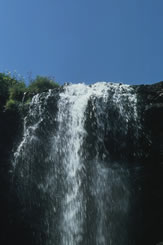- Regional water observation mechanism
- Regional Cooperation Assessment
- Water Quality Monitoring (JP)
- Water scarcity and drought (JP)
- Groundwater (JP)
- Waste water reuse (JP)
- Shared Water Resources Management (JP)
- Linking rural development and water management (JP)
- Waste management
- Water institutions
- Climate Change
- Floods
- Desalination
- Right to Water
- Irrigation
- Satellite data
- Water reports & data
- Hydrology
- Sanitation
- Gender and IWRM
- ArabWAYS
- Non-Revenue Water
- Virtual Water & Water Footprint
- WANA Water Panel
- Water Demand
- Water Governance
- Water Pricing
- Water accounts
- Water nexus Energy
- Geosciences
- Rural Management
 Reuse of Wastewater in Mediterranean Region, Egyptian Experience
Reuse of Wastewater in Mediterranean Region, Egyptian Experience
Water scarcity in the Mediterranean region is one of the most seriousissues. A number of reasons are behind this situation, which include, but are notrestricted to, the relatively uneven distribution of precipitation, high temperatures,increased demands for irrigation water, and impacts of tourism. Climate change isexpected to aggravate the situation even more. The use of wastewater is one of themost sustainable alternatives to cope with water shortage. It would have a numberof advantages that include closing the gap between supply and demand, stoppingthe pollution of fresh water resources, providing sound solution to water scarcityand climate change, and helping to achieve Millennium Development Goals. WithEgypt, trying to cope with water shortage issues, The Ministry of Water Resources,MWRI has developed a NationalWater Resources Plan, with wastewater reuse as acentral mechanism. At present, there are more than 200 wastewater treatment plantsin the country. Urban coverage of improved sanitation gradually increased from45% in 1993 to 56% in 2004. In contrast, rural sanitation coverage remainsincredibly low at 4%. The low coverage, in combination with a sub-optimaltreatment, results in some problems of water pollution and degradation of healthconditions because the majority of villages and rural areas discharge their rawdomestic wastewater directly into the waterways. Drainage water reuse is practicedon a very large scale. The official reuse of agricultural drainage water in irrigationamounted to 4.84 km3/year in 2001. The present aim of the Government of Egypt isto reuse up to 8 km3/year in new reclamation areas in the near future.Meanwhile, ElSalam canal, one of the mega projects in Egypt is transferring a mix of fresh Nilewater and wastewater to Sinai, to irrigate thousands of newly reclaimed areas.
| Creator | Naglaa Mohamed Loutf, Plant Protection Department, Faculty of Agriculture, Suez Canal University, 41522 Ismailia, Egypt (email: naglamag@yahoo.com) |
|---|---|
| Publisher | Naglaa Mohamed Loutf, Plant Protection Department, Faculty of Agriculture, Suez Canal University, 41522 Ismailia, Egypt |
| Type of document | Report |
| Rights | Public |
| File link |
http://academia.edu.documents.s3.amazonaws.com/1668486/naglaa_chapter.pdf |
| File link local |
|
| Source of information | AMAZON AWS |
| Keyword(s) | Mediterranean, Wastewater, Water scarcity, Climate change, EI-Salam canal |
| Subject(s) | ANALYSIS AND TESTS , CHARACTERISTICAL PARAMETERS OF WATERS AND SLUDGES , DRINKING WATER , DRINKING WATER AND SANITATION : COMMON PROCESSES OF PURIFICATION AND TREATMENT , HYDRAULICS - HYDROLOGY , MEASUREMENTS AND INSTRUMENTATION , METHTODOLOGY - STATISTICS - DECISION AID , NATURAL MEDIUM , POLICY-WATER POLICY AND WATER MANAGEMENT , PREVENTION AND NUISANCES POLLUTION , RISKS AND CLIMATOLOGY , SANITATION -STRICT PURIFICATION PROCESSES , SLUDGES , WATER DEMAND , WATER QUALITY |
| Relation | http://scuegypt.academia.edu/NaglaaLoutfy/Papers/291838/Reuse_of_Wastewater_In_Mediterranean_Region_Egyptian_Experience |
| Geographical coverage | Egypt, |
 you are not logged in
you are not logged in





